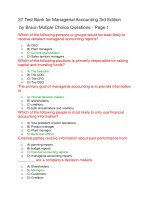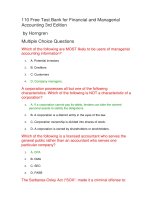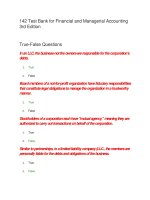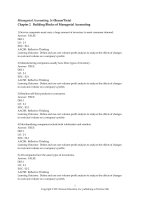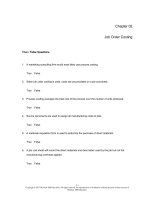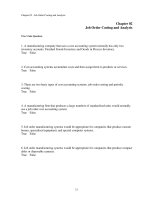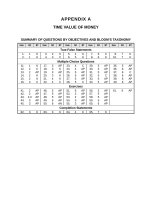Financial managerial accounting 3rd kieso ch15(job order costing)
Bạn đang xem bản rút gọn của tài liệu. Xem và tải ngay bản đầy đủ của tài liệu tại đây (2.68 MB, 60 trang )
Financial &
Managerial
Accounting
3rd Edition
Jerry Weygandt, Paul
Kimmel, Don Kieso
Prepared by
Coby Harmon
University of California, Santa
Barbara
Westmont College
15-1
Job Order Costing
CHAPTER 15
Chapter Outline
LEARNING OBJECTIVES
LO 1 Describe cost systems and the flow of costs in a job order
system.
LO 2 Use a job cost sheet to assign costs to work in process.
LO 3 Demonstrate how to determine and use the predetermined
overhead rate.
LO 4 Prepare entries for manufacturing and service jobs
completed and sold.
LO 5 Distinguish between under-and overapplied manufacturing
overhead.
15-2
Cost Accounting Systems
LEARNING OBJECTIVE 1
Describe cost systems and the flow of costs in a job order system.
Cost Accounting
15-3
Involves measuring, recording, and reporting product
costs.
Accounts are fully integrated into the general ledger.
Perpetual inventory system provides immediate, up-todate information on the cost of a product.
Two basic types: (1) a process order cost system and
(2) a job order cost system.
LO 1
Process Cost System
15-4
Used when a large volume of similar products are
manufactured - (cereal, refining of petroleum, production
of ice cream).
Costs are accumulated for a time period – (week or
month).
Costs are assigned to departments or processes for a
specified period of time.
LO 1
Process Cost System
1. Harvest
ILLUSTRATION 15.1
Process cost system
Potato Chips
Production
2. Clean
3. Slice
ILLUSTRATION 2.1
Process cost system
4. Fry
15-5
5. Bag
LO 1
Job Order Cost System
15-6
Costs are assigned to each job or batch.
Important feature: Each job or batch has its own
distinguishing characteristics.
Objective is to compute the cost per job.
Measures costs for each job completed – not for set time
periods.
LO 1
Job Order Cost System
Illustration shows the recording of costs in a job order cost
system for Disney as it produced two different films.
15-7
ILLUSTRATION 15.2
Job order cost system for Disney
LO 1
Job Order Cost Flow
Flow of costs parallels physical flow of materials as they
are converted into finished goods
15-8
Manufacturing costs are assigned to Work in Process
(WIP) Inventory account.
Cost of completed jobs is transferred to Finished
Goods Inventory account.
When units are sold, cost is transferred to Cost of
Goods Sold account.
LO 1
Job Order Cost Flow
Basic overview of flow of costs in a manufacturing setting
for production of a fire truck.
ILLUSTRATION 15.3
Flow of costs in job order costing
15-9
LO 1
Accumulating Manufacturing Costs
Raw Material Costs
Illustration: Wallace Company purchases 2,000 lithium
batteries (Stock No. AA2746) at $5 per unit ($10,000) and 800
electronic modules (Stock No. AA2850) at $40 per unit
($32,000) for a total cost of $42,000 ($10,000 + $32,000). The
entry to record this purchase on January 4 is:
Jan. 4
Raw Materials Inventory
Accounts Payable
15-10
42,000
42,000
LO 1
Accumulating Manufacturing Costs
Factory Labor Costs
Consists of three costs:
1. Gross earnings of factory workers,
2. Employer payroll taxes on these earnings, and
3. Fringe benefits (such as sick pay, pensions, and vacation
pay) incurred by the employer.
15-11
LO 1
Accumulating Manufacturing Costs
Factory Labor Costs
Illustration: Wallace incurs $32,000 of factory labor costs. Of
that amount, $27,000 relates to wages payable and $5,000
relates to payroll taxes payable in February. The entry to record
factory labor for the month is:
Jan. 31
Factory Labor
32,000
Factory Wages Payable
Employer Payroll Taxes Payable
15-12
27,000
5,000
LO 1
Accumulating Manufacturing Costs
Manufacturing Overhead Costs
Many types of overhead costs
►
Costs unrelated to manufacturing process are expensed.
Costs related to manufacturing process are accumulated
in Manufacturing Overhead account.
►
15-13
For example, property taxes, depreciation,
insurance, and repairs related to the manufacturing
process.
Manufacturing overhead subsequently assigned to
work in process.
LO 1
Accumulating Manufacturing Costs
Manufacturing Overhead Costs
Illustration: Using assumed data, the summary entry for
manufacturing overhead in Wallace Manufacturing Company is:
Jan. 31
15-14
Manufacturing Overhead
13,800
Utilities Payable
4,800
Prepaid Insurance
2,000
Accounts Payable (for repairs)
2,600
Accumulated Depreciation
3,000
Property Taxes Payable
1,400
LO 1
DO IT! 1
Costs
Accumulating Manufacturing
During the current month, Ringling Company incurs the
following manufacturing costs:
a) Raw material purchases of $4,200 on account.
b) Factory labor of $18,000. Of that amount, $15,000 relates
to wages payable and $3,000 relates to payroll taxes
payable.
c) Factory utilities of $2,200 are payable, prepaid factory
insurance of $1,800 has expired, and depreciation on the
factory building is $3,500.
Prepare journal entries for each type of manufacturing cost.
15-15
LO 1
DO IT! 1
Costs
Accumulating Manufacturing
Prepare journal entries for each type of manufacturing cost.
a)
Raw material purchases of $4,200 on account.
Raw Materials Inventory
4,200
Accounts Payable
b)
4,200
Factory labor of $18,000. Of that amount, $15,000 relates
to wages payable and $3,000 relates to payroll taxes
payable.
Factory Labor
18,000
Factory Wages Payable
Employer Payroll Taxes Payable
15-16
15,000
3,000
LO 1
DO IT! 1
Costs
Accumulating Manufacturing
Prepare journal entries for each type of manufacturing cost.
c)
Factory utilities of $2,200 are payable, prepaid factory
insurance of $1,800 has expired, and depreciation on the
factory building is $3,500.
Manufacturing Overhead
15-17
7,500
Utilities Payable
2,200
Prepaid Insurance
1,800
Accumulated Depreciation
3,500
LO 1
Assigning Manufacturing Costs
LEARNING OBJECTIVE 2
Use a job cost sheet to assign cots to work in process.
Assigning manufacturing costs to work in process
results in the following entries.
1. Debits made to Work in Process Inventory
2. Credits made to
15-18
►
Raw Materials Inventory
►
Factory Labor
►
Manufacturing Overhead
LO 2
Assigning Manufacturing Costs
Job Cost Sheet
15-19
Used to record costs chargeable to specific jobs.
Constitutes the subsidiary ledger for work in process
account.
Each entry to Work in Process Inventory must be
accompanied by a corresponding posting to
one or more job cost sheets.
LO 2
ILLUSTRATION 15.4
Job cost sheet
15-20
LO 2
Raw Material Costs
15-21
Assigned to a job when materials are issued in
response to requests.
Materials requisition slip
►
Written authorization for issuing raw materials.
►
May be directly issued to use on a job - direct
materials (charged to Work in Process Inventory).
►
May be considered indirect materials – charged to
Manufacturing Overhead.
LO 2
ILLUSTRATION 15.5
Materials requisition slip
15-22
LO 2
Raw Material Costs
Illustration: Wallace uses $24,000 of direct materials and $6,000
of indirect materials in January, the entry is:
Jan. 31
Work in Process Inventory
Manufacturing Overhead
Raw Materials Inventory
15-23
24,000
6,000
30,000
LO 2
ILLUSTRATION 15.6
Job cost sheets–posting
of direct materials
Post
individual
direct
materials
requisition
slips to job
cost sheets
15-24
LO 2
Factory Labor Costs
15-25
Assigned to jobs on basis of time tickets.
Time tickets are prepared when work is performed.
Time tickets indicate:
►
Employee
►
Hours worked
►
Account and job charged
►
Total labor cost
LO 2
